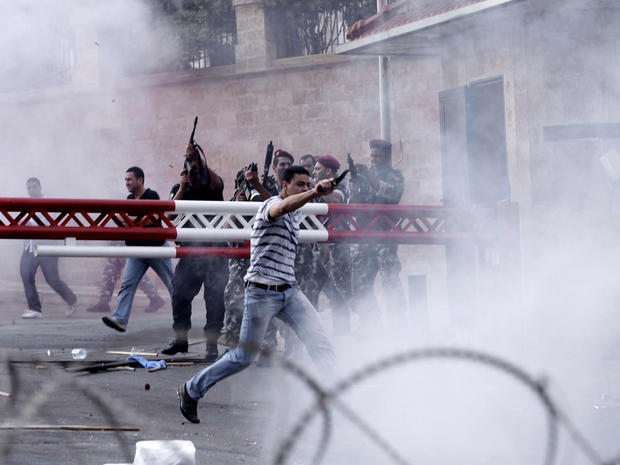Protesters try to storm Lebanese gov't HQ
Last Updated 11:19 a.m. ET
BEIRUT Lebanese soldiers fired guns and tear gas to push back hundreds of protesters who broke through a police cordon and tried to storm the government headquarters in Beirut. The enraged crowd came from the funeral of a top Lebanese intelligence official assassinated in a massive car bombing.
The protesters blame Friday's killing on Syria — and they consider the government in Beirut to be far too close to the regime there. Lebanon for much of the past 30 years has lived under Syrian military and political domination.
Former Lebanese Prime Minister Fuad Saniora appealed for calm.
"The use of violence is unacceptable and does not represent the image that we want," Saniora said in a televised address. "We appreciate the feelings of the people."
Several hundred protesters made it to within 50 yards of the entrance of Lebanon's government palace, with thousands more behind them. The gunfire appeared to push the crowd back.
Army commandoes marched into the streets wielding clubs.
The crowd had marched from Martrys Square, where thousands of people had turned out for Brig. Gen. Wissam al-Hassan's funeral. Al-Hassan, 47, was a powerful opponent of Syria in Lebanon. He headed an investigation over the summer that led to the arrest of former Information Minister Michel Samaha, a Lebanese politician who was one of Syria's most loyal allies in Lebanon. He was among eight people killed in the attack on Friday.
"He was killed while he was defending his country," said Samer al-Hirri, who traveled from northern Lebanon to attend the funeral.
Even before Friday's bombing, the civil war in neighboring Syria had set off violence in Lebanon and deepened tensions between supporters and opponents of President Bashar Assad's regime. The attack heightened fears that Lebanon could easily plunge back into cycles of sectarian violence and reprisal that have haunted it for decades.
France's foreign minister said it was likely that Assad's government had a hand in the assassination. Laurent Fabius told Europe-1 radio that while it was not fully clear who was behind the attack, it was "probable" that Syria played a role.
"Everything suggests that it's an extension of the Syrian tragedy," he said.
